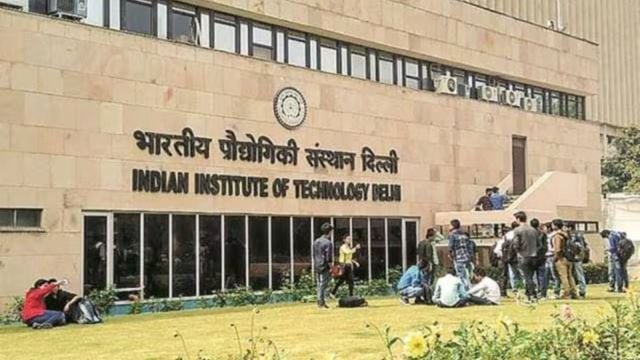IIT-Delhi leads India in QS World University Rankings Sustainability 2025
Globally, the University of Toronto is the top ranked university this year, ahead of ETH Zurich in second, and Lund University in Sweden and University of California, Berkeley (UCB) in joint third.
 The top place has been bagged by IIT Delhi this year (globally 171th rank) which saw an improvement of 255 ranks. (Representative image/ file)
The top place has been bagged by IIT Delhi this year (globally 171th rank) which saw an improvement of 255 ranks. (Representative image/ file)The QS Quacquarelli Symonds, global higher education experts, today released the third edition of the ‘QS World University Rankings: Sustainability 2025’. The top place has been bagged by IIT Delhi this year (globally 171th rank) which saw an improvement of 255 ranks, followed by IIT Kharagpur at 202 rank globally, an improvement of 147 ranks, and the third rank has been taken by IIT Bombay with an improvement of 69 ranks (global rank 234).
A total of 78 Indian universities feature in the 2025 QS Sustainability rankings, with nine of the top 10 institutions in the country improving their ranking this year. A total of 21 varsities are new to the ranking this time.
| Rank in India | 2025 Ranking | 2024 Ranking | Change | Institution |
| 1 | 171 | 426 | 255 | Indian Institute of Technology Delhi (IITD) |
| 2 | 202 | 349 | 147 | Indian Institute of Technology Kharagpur (IIT-KGP) |
| 3 | 234 | 303 | 69 | Indian Institute of Technology Bombay (IITB) |
| 4 | 245 | 522 | 277 | Indian Institute of Technology Kanpur (IITK) |
| 5 | 277 | 344 | 67 | Indian Institute of Technology Madras (IITM) |
| 6 | 299 | 220 | -79 | University of Delhi |
| 7 | 376 | 505 | 129 | Indian Institute of Science |
| 8 | 396 | 449 | 53 | Vellore Institute of Technology (VIT) |
| 9 | 401 | 576 | 175 | Manipal Academy of Higher Education – Manipal University (MAHE) |
| 10 | 412 | 496 | 84 | Anna University |
IIT Kanpur and IIT Madras bagged the fourth and fifth ranks in India with an improvement of 177 and 67 ranks respectively, and global ranks of 245 and 277 respectively. University of Delhi is the only Indian varsity which has seen a decline in ranks this year, as it slipped from 220 last year to 299 rank this year, but has appeared sixth on the Indian list.
The Indian Institute of Science, Vellore Institute of Technology (VIT), Manipal Academy of Higher Education – Manipal University (MAHE) and Anna University have featured at the seventh, eighth, ninth and tenth ranks, respectively.
Indian Institute of Technology Delhi (IIT-D) and Indian Institute of Technology Kanpur (IIT-K) are both featured in the global top 100 in the Environmental Impact category, which is worth 45 per cent of the overall score. IIT-D is placed 55 and IIT-K is 87 in the category. Indian Institute of Technology Bombay (IIT-B) is also notable, taking the 101st spot, and Indian Institute of Technology Kharagpur (IIT-KGP) coming in at 113.
Top 10 Indian institutions in the Environmental Impact category, which includes Environmental Sustainability, Environmental Education and Environmental Research lenses:
| Institution | Environmental Impact Rank |
| Indian Institute of Technology Delhi (IITD) | 55 |
| Indian Institute of Technology Kanpur (IITK) | 87 |
| Indian Institute of Technology Bombay (IITB) | 101 |
| Indian Institute of Technology Kharagpur (IIT-KGP) | 113 |
| Indian Institute of Science | 179 |
| Jadavpur University | 189 |
| Indian Institute of Technology Madras (IITM) | 204 |
| University of Delhi | 244 |
| Vellore Institute of Technology (VIT) | 268 |
| Jawaharlal Nehru University | 323 |
Within the Social Impact category, Indian universities can look to improve their indicator scores in the Health and Wellbeing, Impact of Education and Equality lenses, where no institutions from the country feature in the top 350. Universities from India scored better in the Knowledge Exchange and Employability and Outcomes lenses.
| Institution | Knowledge Exchange Rank | Institution | Employability and Outcomes Rank |
| University of Delhi | 121 | Indian Institute of Technology Delhi (IITD) | 116 |
| Vellore Institute of Technology (VIT) | 161 | Indian Institute of Technology Bombay (IITB) | 116 |
| Indian Institute of Technology Kharagpur (IIT-KGP) | 197 | Indian Institute of Technology Kharagpur (IIT-KGP) | 130 |
| Indian Institute of Technology Delhi (IITD) | 218 | Indian Institute of Technology Madras (IITM) | 191 |
| Manipal Academy of Higher Education – Manipal University (MAHE) | 227 | Indian Institute of Technology Kanpur (IITK) | 267 |
| Indian Institute of Technology Bombay (IITB) | 241 | ||
| SRM INSTITUTE OF SCIENCE AND TECHNOLOGY | 244 |
IIT Delhi (IITD) is the top ranked Indian institution in the Social Impact (362) and the Environmental Impact (55) categories. It is also top in two lenses – Employability and Outcomes (116) and Environmental Research (256).
Manipal Academy of Higher Education – Manipal University (MAHE) is the top ranked Indian university in the Governance category. It is also top in India for Equality, ranked at 390 globally.
IIT Bombay is top in the Environmental Sustainability lens, placed at 38 globally. IIT Kharagpur is top in India for two lenses — Impact of Education (676) and Health and Wellbeing (391). Also, DU is top in India for Knowledge Exchange, coming in at 121 globally. IISc is placed 32rd worldwide in the Environmental Education lens.
“Of the 78 Indian universities that feature in the 2025 QS Sustainability rankings, 34 have improved on last year’s placing and eight have maintained their positions. This is an excellent achievement for the Indian higher education ecosystem and shows that Indian universities are forging ahead with their sustainability initiatives.
“Impact of Education and Health and Wellbeing are two areas where there is room for improvement in the Indian higher education system. However, institutions are already heading in the right direction. Indian Institute of Technology Kharagpur (IIT-KGP), Indian Institute of Technology Roorkee (IITR) and Indian Institute of Technology Delhi (IITD) all increased their positions by more than 100 places in the Health and Wellbeing lens in 2025.
“Similarly, Indian Institute of Technology Madras (IITM) improved its position in the Impact of Education lens by 341 places and Indian Institute of Technology Bombay (IITB) by 386 places this year. We commend all those Indian institutions that are continuing to develop their sustainability ambitions in this vital area,” said Ben Sowter, Vice President of QS.
Global rankings
Globally, the University of Toronto is the top ranked university this year, ahead of ETH Zurich in second, and Lund University in Sweden and University of California, Berkeley (UCB) in joint third.
This time, seven African universities rank in the top 500. The University of Cape Town ranks 45th, the highest in the region. Cairo University is ranked 370th. Australia has 14 universities in the top 100, with the University of Melbourne maintaining its position at ninth. QUT is the only Australian institution to climb the table.
| 2025 Rank | 2024 Rank | Institution | Country |
| 1 | 1 | University of Toronto | Canada |
| 2 | 18 | ETH Zurich | Switzerland |
| 3 | 8 | Lund University | Sweden |
| 3 | 2 | University of California, Berkeley (UCB) | United States |
| 5 | 189 | UCL | United Kingdom |
| 5 | 4 | University of British Columbia | Canada |
| 7 | 6 | Imperial College London | United Kingdom |
| 7 | 15 | The University of Edinburgh | United Kingdom |
| 9 | 3 | The University of Manchester | United Kingdom |
| 9 | 9 | The University of Melbourne | Australia |
In Asia, six universities from four countries rank in the top 100. The University of Tokyo is the highest-ranked, at 44th. Mainland China has 114 ranked universities, led by Fudan University in 133rd spot. Despite having the second-highest number of entries, no Mainland Chinese university is in the top 100. Fudan University, the country’s top performer, ranks 133 after climbing nine places.
The United States leads in representation, with 239 institutions ranked. The University of California, Berkeley is joint third but the country’s average score trails Europe and Australasia. The UK has 26 universities in the top 100 globally and more top 10 universities than any other country. The University of Sheffield has been ranked 27th globally. EHT Zurich is the top European university, climbing to second place. Sweden’s Lund University has also made significant progress, climbing from eighth to joint third thanks to improvements in Environmental Education. New Zealand has all eight universities in the top 500, achieving the highest average score. The University of Auckland leads, ranked 17th globally.






- 01
- 02
- 03
- 04
- 05

























